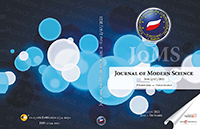Potential and desired consequences of the Covid-19 pandemic for research in economic sciences
Potential and desired consequences of the Covid-19 pandemic for research in economic sciences
Author(s): Marian Gorynia, Piotr Banaszyk, Przemysław Deszczyński, Krzysztof MalagaSubject(s): Economy
Published by: Wydawnictwo Akademii Nauk Stosowanych WSGE im. A. De Gasperi w Józefowie
Keywords: economic sciences; economic paradigms; the Covid-19 pandemic; evolution of economic sciences; international aspects of ES;
Summary/Abstract: ObjectivesThe authors posit the need for the modification or even revision of how economic sciences (ES) are practiced in ontological, epistemological, and methodological aspects. The need results from the impact of several factors that appeared even in the pre-pandemic period, for which Covid-19 may be a complementary and reinforcing circumstance that may even directly determine the change. The structure of the article follows its goal, which is the author’s reflection on the main thesis. To this end, the author’s selected four issues to exemplify the areas that require change, for which they propose a set of postulates that constitute the desired modifications in ES.Material and methodsThe main method we used was that of critical literature analysis and desk study – as for the scientific approach this article uses a qualitative design of research.ResultsThis article discusses four sample research areas from ES. Namely, they are global supply chains, international competitiveness, globalization and development economics. The study perspective is therefore focused on the international aspects.ConclusionsSince a radical change in economic policy and business practice is necessary, the approach and research methodology in ES should also change, which means the need to change the paradigm of these sciences. It is worth remembering that the task of ES is to model economic and business processes, because ES have both a cognitive-explanatory (positive) and directive-suggestive (normative) component. The latter component are patterns and recommendations related to the economic and business reality, and they should be different from those known from the past and to a large extent still practiced in the present.
Journal: Journal of Modern Science
- Issue Year: 47/2021
- Issue No: 2
- Page Range: 97-121
- Page Count: 25
- Language: English

